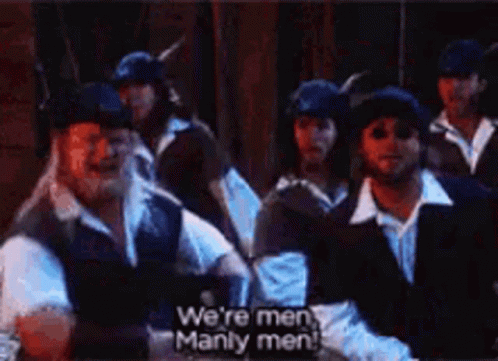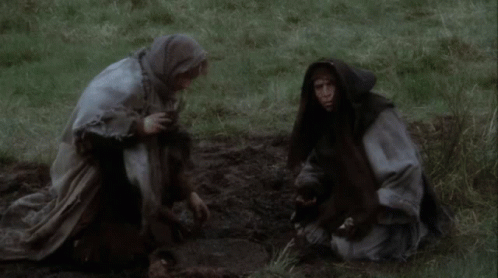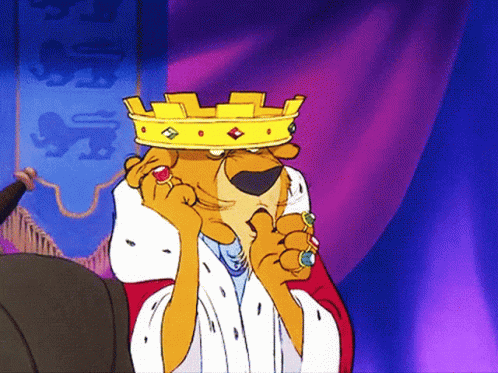But Why
-
@Roz Just wait until he discovers the concept of character development.
-
@De-Villefort said in But Why:
@Evilgrayson
If Elon Musk had all his billions stolen by Jeff Bezos then raised a mercenary army of criminals to kill Bezos and steal everything he had, would you consider that a heroic story?Well that’s the story of Robinhood with the names changed. He was the son of a nobleman who had all his wealth taken by the corrupt Sheriff while the king was away fighting a war. He only became an outlaw because he was suddenly poor. He didn’t give a wet squirt about the poor people until he was one of them.
In some versions of the story the Sheriff killed his father, in some versions he was a knight who returned from the crusades to find his home had been plundered, but the one thing that holds true is that the start of the story is rich-guy-on-rich-guy violence and the rest of the story is all about taking back what was stolen from him.
Disney may have romanticized it with adorable foxes but make no mistake, this was a story about a wealthy lord standing along side a band of thieves to take what they felt they were owed.
Even in the Disney version he didn’t start giving away money until the Sheriff started squeezing the peasants and offering high rewards for Robin’s head. His generosity was a move made out of tactical necessity, not out of kindness.
One version of Robin Hood is the son of a nobleman, sure - but there are many versions. Son of a nobleman plays better on TV and in movies, partly because the USA is obsessed with nobility and it panders more to modern sensibilities - but in a lot of other versions, including most (if not all) of the historical ones, he’s just some bloke, partly because his fabled weapons were not noble’s weapons.
Any idiot can pick up a quarterstaff, and any idiot did. Waving it about in a reasonably-competent fashion isn’t difficult. Being good with a quarterstaff, though, that takes practice, and it’s fundamentally a peasant’s weapon. Any idiot can pick up a longbow, but if they do they’re in for a world of pain. It’s a weapon that takes decades to master, and archers were most often started in childhood. Archeologists can tell you which skeletons belong to archers because it deforms the bones. And again, the longbow is fundamentally a peasant’s weapon.
And it’s Robin Hood. Robin, as in the first name. Hood, as in the garment. Robin Hood, as in a pun or play on words. There are many legends and there were probably just as many Robins because it was the John Doe name for outlaws in the day. But the legends that have come down to us are not about taking power. They’re about tweaking the noses of the powerful in what was a horrifically unjust society run on the backs of people who were tied from birth to death to their lord’s land. This was a hero of the people, as told by the people - why would they elevate one of their oppressors into legend?
You can’t rely on Disney for anything. If you’ve ever read Victor Hugo’s Hunchback of Notre Dame, you’ll know exactly what I mean.
-
@Evilgrayson Besides, there’s only one true version of Robin Hood’s story.

-
@De-Villefort said in But Why:
Robinhood
Disney may have romanticized it with adorable foxesI had such a crush on that fox as a kid.

-
@Evilgrayson said in But Why:
why would they elevate one of their oppressors into legend?
Not that I disagree with the majority of your point, but this is a ridiculous rhetorical question, especially since, while it may not be the case for (the oldest versions of) Robin Hood, many “heroes of the people” have been nobles, elevated to legend not because they weren’t oppressors and/or part of the oppressive caste (not class, we’re talking pre-Capitalism) but because even for the poor, nobility was inherently valuable and put you in a higher moral strata.
Like, come on, “why would they elevate one of their oppressors into legend”? They STILL do it. Look at Elon Musk fanboys, essentially waving pom-poms for an idiot.
-
Oh, come on. Even if the story of Robin Hood could be boiled down to “nobles fighting,” there is clearly a depiction of class conflict within the narrative. It’s not “medieval Elon Musk vs. Jeff Bezos” because of the structural differences between the Loxley family and the stratification of medieval English society in terms of the ruling class’s power in serfdom.
I’m certainly not going to say that Robin Hood wasn’t a member of the bourgeoisie – he held many privileges that his outlaw companions never had and could likely send himself back into upholding western imperialism in the crusades if he wanted, but he achieved an understanding of class consciousness within the context of the story.
Even if he hadn’t stolen from the rich and given to the poor – and indeed, he does not in some versions – a guerrilla force standing against the monopoly on power that the state (in this case, the sheriff of Nottingham) held over the proletariat would serve as an appropriate propaganda of the deed which, in many ways, can be its own reward. Robin Hood even wholly being a selfish hero (e.g., get back my stuff so I can do a feudalism on the locals, save my girlfriend), does not detract from the material symbolism involved which is why it became an enduring myth in the West.
-
@Coin As far as I recall, Siddhartha Gautama was of royal blood, then he character developed himself some enlightenment and became known as the Buddha.
It’s a tale as old as time.
That and who had the money to have books? The nobility. So who should the stories be about…?
-
@Coin As far as I recall, Siddhartha Gautama was of royal blood, then he character developed himself some enlightenment and became known as the Buddha.
It’s a tale as old as time.
That and who had the money to have books? The nobility. So who should the stories be about…?
Pretty much.
-
@somasatori said in But Why:
Oh, come on. Even if the story of Robin Hood could be boiled down to “nobles fighting,” there is clearly a depiction of class conflict within the narrative. It’s not “medieval Elon Musk vs. Jeff Bezos” because of the structural differences between the Loxley family and the stratification of medieval English society in terms of the ruling class’s power in serfdom.
I’m certainly not going to say that Robin Hood wasn’t a member of the bourgeoisie – he held many privileges that his outlaw companions never had and could likely send himself back into upholding western imperialism in the crusades if he wanted, but he achieved an understanding of class consciousness within the context of the story.
Even if he hadn’t stolen from the rich and given to the poor – and indeed, he does not in some versions – a guerrilla force standing against the monopoly on power that the state (in this case, the sheriff of Nottingham) held over the proletariat would serve as an appropriate propaganda of the deed which, in many ways, can be its own reward. Robin Hood even wholly being a selfish hero (e.g., get back my stuff so I can do a feudalism on the locals, save my girlfriend), does not detract from the material symbolism involved which is why it became an enduring myth in the West.
Though you can make a case, especially for the versions of the story including Prince John, that the taxes levied on the people by Prince John (and enforced by Nottingham) are actually a consequence of King Richard the Lionheart’s frivolous and obsessive overspending on the Crusades. Did Prince John overtax, or was he --within the limited moral understand he had as a nobleman and not a serf-- trying to recoup the losses that England (and Robin’s) “beloved and just” King Richard was tossing overboard every day he spent trying to advance Christendom?
You can’t tell that story. Prince John has to be the bad guy who is overtaxing and living in luxury using the poor’s money, so that Robin can steal it back and give it to the people again. Otherwise, how is King Richard supposed to be the good guy who comes back and chastises and punishes his wicked wicked brother who was doing this BAD THING that King Richard would NEVER DO, lolololololol.
-
You can’t tell that story. Prince John has to be the bad guy who is overtaxing and living in luxury using the poor’s money, so that Robin can steal it back and give it to the people again. Otherwise, how is King Richard supposed to be the good guy who comes back and chastises and punishes his wicked wicked brother who was doing this BAD THING that King Richard would NEVER DO, lolololololol.
Damn tho, I wish we’d tell that story.
-
@somasatori To be fair, when you have a single-roomed hovel you share with the livestock, and some bloke who isn’t covered in shit rides past with a whole retinue, it’s going to look like he’s living in luxury using the poor’s money.
-
@somasatori omg same.
Just thinking about what a great move that would be on a L&L game. Who wants to be the John to my Richard. I won’t kill you, just exile you into vacay until players forget. You can have a nice percent of the extra tax income to spend on cool gear.
-
-
@Evilgrayson said in But Why:
@somasatori To be fair, when you have a single-roomed hovel you share with the livestock, and some bloke who isn’t covered in shit rides past with a whole retinue, it’s going to look like he’s living in luxury using the poor’s money.

-
@De-Villefort were you aware that James Corey is the pen name of two authors writing together. One was more known as a fantasy author, the other was an assistant to a famous fantasy author.
If you’re never read any of William Gibson or Octavia Butler I’d recommend them highly. Gibson especially given he’s a (arguably the( titan of cyberpunk. And is still writing.
-
-
@mietze I second this, Gibson is amazing. If you want a good new cyberpunk book, The Body Scout by Lincoln Michel. So great about sports, and cybernetics at start with, than gets all sorts of amazing!
-
@De-Villefort were you aware that James Corey is the pen name of two authors writing together. One was more known as a fantasy author, the other was an assistant to a famous fantasy author.
If you’re never read any of William Gibson or Octavia Butler I’d recommend them highly. Gibson especially given he’s a (arguably the( titan of cyberpunk. And is still writing.
Seconding Octavia Butler (and William Gibson)! Her Earthseed books are very salient these days.
I also want to plug Ursula K. Leguin, and everyone should read the book This Is How You Lose The Time War by Amal El-Mohtar and Max Gladstone.
If you want good industrial revolution fantasy (or science fiction in the case of City & the City) check out China Miéville.
N. K. Jemisin’s recent-ish Broken Earth trilogy is a solid choice for science fantasy series.
One really interesting (and deeply sad and challenging) take on the generation ship story was Rivers Solomon’s An Unkindness of Ghosts
-
Incidentally, is anyone else amused by someone using the username “De Villefort” going on about how the only good fiction is the one that isn’t about selfish characters?
I can’t seem to remember what the novel that the name “De Villefort” comes from is about.
[snaps fingers]
It can’t have as one of its themes the obsessive descent of a man driven solely by vengeance for crimes committed against his person…
-
So umm…
What’s the anime from the first post? Asking for a friend.

